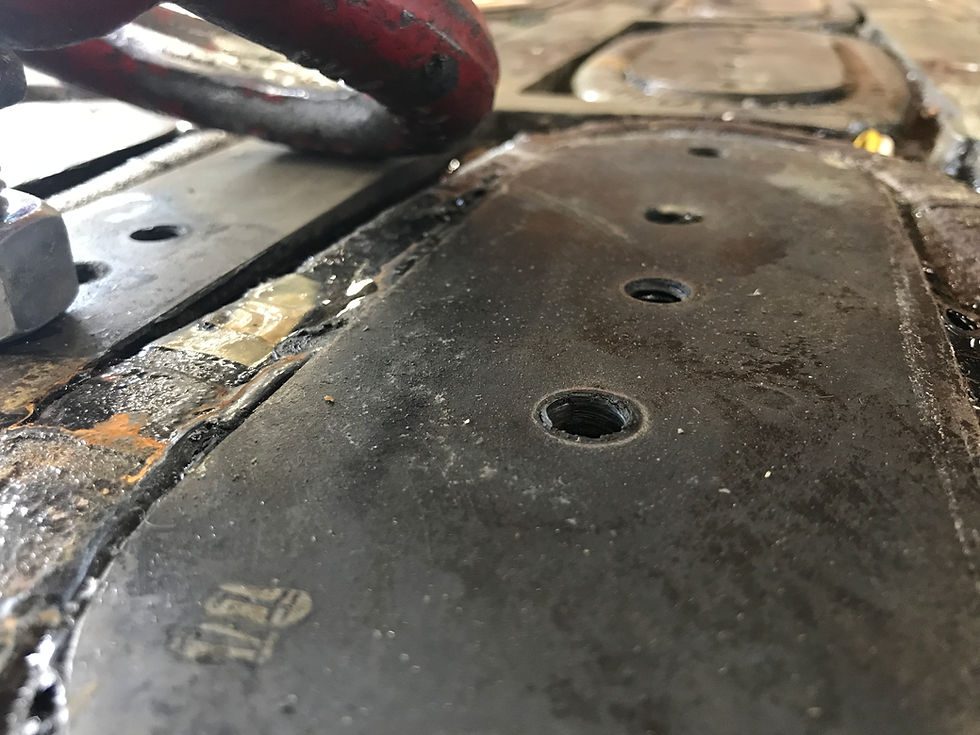Electromagnetic chucks, in general, are rugged and durable products that with proper care provide many years of high-performance service. However, as with any electrical equipment, long use can eventually cause deterioration, resulting in reduced performance or failure. This trouble shooting guide is designed to help you locate the cause of the difficulty when a chuck has failed or shows reduced holding power. It lists the most common problems experienced with magnetic chucks, indicates the possible causes of each problem, shows specific test steps to confirm the cause, and the proper corrective action. In addition, this guide distinguishes between those corrections that can be made in the field and those repairs that require factory services.

a situation of reduced holding power does not always indicate a faulty chuck or a need for repair
General Principles of Operation and use of Electromagnetic Chucks
Electromagnetic chucks consist of one or more electrical coils arranged in a steel body structure so that energizing the coils with a direct current creates a steady magnetic field. The top plate of the chuck is designed to direct the magnetic field so that it will go from the top plate through the workpiece and return to the chuck to form a closed magnetic circuit. This magnetic circuit is as important as properly operating chuck in obtaining adequate holding power.
The holding force depends on the design of the chuck, the amount of magnetic flux being generated, the location of the workpiece on the chuck surface, the air gap between the chuck and the work piece, the size, shape and magnetic properties of the work piece, and the presence of shunts that may prevent the magnetic flux from passing through the workpiece. A change in any of these factors will alter the holding force. Since many of these depend on the workpiece and the circuit it forms, a situation of reduced holding power does not always indicate a faulty chuck or a need for repair. When a chuck is at fault, the problem may be within the body of the chuck itself, in the electrical connections, or in the external rectifier or controls. In addition, performance can be affected by the surface condition of the chuck. The surface should be re-ground, as required to maintain a flat and flawless condition.

We repair all brands of chucks including Magna-Lock USA, Blanchard, OSWalker and Taft-Peirce.
Rotary Chucks Require Special Procedures
The rotation of rotary chucks in service requires the use of brushes and contact rings at the center of the chuck to bring the electrical current to the coils. If your problem is with a rotary chuck, first check the external connections and controls, according to the test steps listed in the charts included herein. If these tests show that proper voltage is reaching the input leads to the chuck, further tests must be made at the brush and collector ring assembly. Access to this assembly in Blanchard rotary chucks is on the underside, so that the chuck must be removed from the machine. On Magna-Lock USA chucks, access is through a cover plate on the top side of the chuck.
In either case, remove the cover plate and examine the brushes for dirt and wear. Each spring-loaded brush should move freely in the brush holder and contact the ring firmly. Replacement kits for worn brushes are available from Obsidian Manufacturing Industries, Inc. If the brass collector rings are dirty, pitted or discolored, they should be cleaned and polished or it should be replaced.
In rotary chucks, the electrical resistance test for circuits continuity is made at the collector rings. First remove the brushes or block them from contact with the collector ring by inserting an insulating spacer between the brush and the ring. Using an ohmmeter, test the resistance from each ring to ground. The reading should exceed 100,000 ohms. To test for circuit continuity, check the resistance reading across the two rings. The resistance should not differ by more than 10% from the standard value, which is available from any service technician at Obsidian Manufacturing Industries, Inc. If the resistance readings indicate an open, shorted or grounded coil, the chuck will require a factory repair.
When replacing the cover plate on Magna-Lock USA chucks, use a new gasket to assure a good closure against moisture penetration.

Obsidian Manufacturing Industries, Inc. will preform these repairs on all brands of electromagnetic chucks, at a cost less than that of a new chuck, and usually with a warranty on the repair equal to that of a new chuck.
Some chuck problems can be corrected right at your plant; others require removing the chuck from service for factory repairs. Obsidian Manufacturing Industries, Inc. will perform these repairs on all brands of electromagnetic chucks, at a cost less than that of a new chuck, and usually with a warranty on the repair equal to that of a new chuck. We have a fluctuating stock of rental chucks that are available to maintain production while your own is being repaired. For technical assistance, rental chuck information, cost estimates, and shipping instructions on repairs, contact Obsidian Manufacturing Industries, Inc. at 815-962-8700 or info@obsidianmfg.com.

Obsidian Manufacturing Industries, Inc. chuck repairs include a two-year warranty.

Obsidian Manufacturing Industries, Inc. is a Rockford, Ill. manufacturing company and is the OEM for Magna-Lock USA workholding, MagnaLift & Power-Grip lift magnets, and Arter Precision Grinding Machines as well providing surface grinding services. They are located at 5015 28th Ave. in Rockford, Ill. with a phone number of 815-962-8700. Check out more at obsidianmfg.com/brands.
_edited.png)

Comentarios